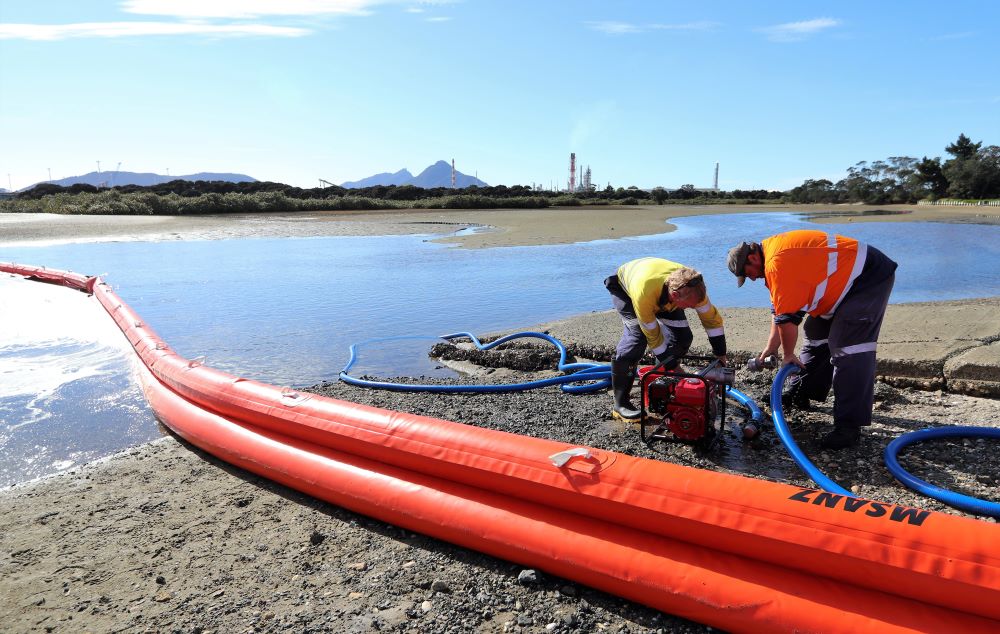What we do
Our Regional Harbourmaster and the maritime team carry out regular harbour patrols to make sure harbour users are sticking to the rules. They can issue an instant fine if you are breaking a harbour bylaw – find out more at: www.nrc.govt.nz/safeboating.
They also:
- ensure more than 300 navigation aids are kept in good condition
- respond to incidents reported by the public
- respond to marine pollution incidents such as oil spills
- issue mooring licences
- promote harbour safety
- help pilot ships safely into our harbours.
Usually the Harbourmaster leads the response to a maritime incident, such as a sinking, grounding, oil spill or collision.
Visit Useful links to learn about matters the maritime team doesn’t deal with.
Report a problem
Our region has the largest coastline in New Zealand, and we need your help to keep it in the best state possible.
If you spot something wrong on one of our harbours or Northland’s many lakes, please call our 24/7 Environmental Hotline on 0800 504 639.
Things we want to know about include:
- suspected sewage discharges
- oil spills
- chemical spills
- navigation light breakdowns
- navigation hazards such as floating logs in channels
- dangerous boating
- maritime bylaw infringements
- suspected pollution of any sort.
Harbour safety management
Vessels that visit our ports and harbours must comply with safety, security and environmental protection regulations. These regulations apply to cargo and passenger vessels, fishing boats, charter boats and all other commercial and recreational craft.
The New Zealand Port and Harbour Marine Safety Code, produced by Maritime New Zealand, provides measures for the safe management of ships in ports and harbours. It also includes measures to prevent serious harm to people, and protect the marine environment.
Our maritime team has established a Harbour Safety Management System for Northland harbours to ensure we comply with this code.
Find out more about the New Zealand Port and Harbour Marine Safety Code from the Maritime New Zealand website.
Responding to oil spills
Whangārei Harbour has a steady stream of tankers coming into Marsden Point Oil Refinery. This shipping activity puts us all at risk if a major oil spill occurs.
Our team has prepared an Oil Spill Contingency Plan and holds regular training exercises to make sure the right people and equipment can be put into action quickly.
The strategy is to contain and clean up as much oil as possible before it reaches our precious shoreline, fishing grounds and shellfish beds.
We have a large amount of oil spill equipment housed at Marsden Point to help us do the job. We maintain the equipment but it belongs to Maritime New Zealand.
Our team respond to all oil spills. When an oil spill is too large to be dealt with on a local basis, Maritime New Zealand staff will take over the clean-up with help from us.

Oil spill response exercise at Marsden Point.
Buoys and beacons
We look after more than 300 navigation aids around the region, to keep them in good condition.
They’re checked at least once every six years, though many are checked more frequently (eg. if issues are reported or lights aren’t working). You can help keep Northland’s navigation aids in good shape by reporting issues to our 24/7 Hotline: 0800 504 639.
We follow good practice to ensure that marine pests aren’t spread via the navigation aids. For example, while it isn't suitable to antifoul the navigation aids, any marine growth on them is checked before it’s removed and disposed of safely on land.
Events on the harbour
We coordinate events on the water to ensure that they don't clash, and that appropriate safety precautions have been taken.
If you are planning an event, such as a race, speed trial or competition on the harbour, please call us or register your harbour or coast special event first.
The Navigation Safety Bylaw gives more information on what you need to do and how much notice we need.
